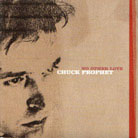June 2002
If this disc is any indication, Prophet has thrown off the constraints of alt.country. No Other Love has an identifiable character, but it covers a lot of stylistic territory. Prophet produced the disc and he approached the recording of each song with a fresh ear, letting it find its own sound. On the title track, for instance, he takes a fairly simple song structure and a short, repeated lyric and lets them build, adding small details with each repetition of the verse until the song reaches a powerful emotional climax. No element of the arrangement overpowers the simple beauty of the lyric: "No other love/Mama I’m flyin’/No other love/Mama I’m flyin’/ I can go, I can go anywhere/No other love can take me there." Prophet has a solid reputation as a session guitarist from his work on recordings by Kelly Willis, Smash Mouth, and Cake, among others. Yet No Other Love isn’t a guitar disc -- or, at least, it’s not a disc designed to highlight Prophet’s breathtaking guitar skills. It’s a songwriter’s disc, and Prophet uses his considerable instrumental abilities to bring his songs to life. The guy’s definitely got guitar-hero chops, but he uses them subtly. There’s a nicely played wah-wah guitar in "After the Rain," but where another guitarist would have pushed it to the front of the mix, here it rests slightly back. It’s one element among many in a track that’s carefully structured. While it’s clear that Prophet approaches his music as a craftsman, he has a playful streak that he gives full rein here. It makes its first appearance in the opening lines of "What Can You Tell Me": "I lost control on the Miracle Mile/She had big hair and an innocent smile/What can you tell me?" His wit is musical as often as it is verbal. "I Bow Down To Every Woman I See" opens with an amusing sideways reference to "Ode to Billie Joe" and contains this gem: "Her father was religious/Mother was too/She yearned to be a model/Had issues with food." Prophet’s sense of humor allows him to make pointed observations about modern life without being overbearing or self-righteous. Prophet is particularly adept at using a few small, well-chosen details to fashion a complex tale. "Run Primo Run" is the story of a botched robbery that comes back years later to haunt the protagonist, now settled into a comfortable family life. His partner turns himself in after a religious conversion and in the final verse we see Primo running to his tool shed to hide from the police (Prophet informs us that, "The barbecue was in full swing"). In four minutes and a few short verses, Prophet tells a tale as tightly constructed as a good short story. Best of all is the tune that drives it: a Farfisa organ-based rocker that evokes both Dylan and Doug Sahm. No Other Love contains at least one genuine classic. In a fair world, "Summertime Thing" would be in heavy rotation on every radio station in the US from now through the end of September, after which it would join "Hot Fun in the Summertime" as an official anthem of the season. Prophet captures the spirit of carefree youth and summer in the first two lines, "Well the sun is burning down on the pavement/Money in the bank, I ain’t gonna save it." He continues with an evocation of things that will bring memories of your late-teen and college summers roaring back -- from the Beach Boys and "Help Me Rhonda" to backyard parties. It’s nostalgic and beautiful without being maudlin. Although Prophet doesn’t really resemble Beck, they share the ability to combine older music traditions with more current approaches. Prophet uses sampling, rhythm boxes and other new techniques -- he’s not trying to be hip; you can tell he likes the sounds he’s using and he’s having fun with them. That sense of play pervades the disc; even tracks heavy in sonic detail remain light on their feet. No Other Love makes me want to hear everything Chuck Prophet’s ever done. I have no idea if his other discs have been leading up to this or if all his work is this self-assured, but No Other Love is the work of a musician who’s confident of his abilities and knows how to get the sound he wants. I’ll be very surprised if I hear a better disc this year. GO BACK TO: |
 Chuck Prophet - No Other
Love
Chuck Prophet - No Other
Love![[Reviewed on CD]](../format/regcd.gif) Chuck
Prophet’s new disc, No Other Love, is his sixth since 1990, and most of you
probably haven’t heard of him. Neither had I. Prophet began recording in the mid-'80s
with a California band, Green on Red, which is often cited as a precursor to alt.country
bands like Wilco and Son Volt. I haven’t heard Green on Red either. All I know is
that halfway through "What Can You Tell Me," the first track on No Other
Love, I was reading the CD booklet intently to find out who produced the disc, who
played on it, what was going to happen next. I was hooked and I stayed hooked for the next
43 minutes.
Chuck
Prophet’s new disc, No Other Love, is his sixth since 1990, and most of you
probably haven’t heard of him. Neither had I. Prophet began recording in the mid-'80s
with a California band, Green on Red, which is often cited as a precursor to alt.country
bands like Wilco and Son Volt. I haven’t heard Green on Red either. All I know is
that halfway through "What Can You Tell Me," the first track on No Other
Love, I was reading the CD booklet intently to find out who produced the disc, who
played on it, what was going to happen next. I was hooked and I stayed hooked for the next
43 minutes.